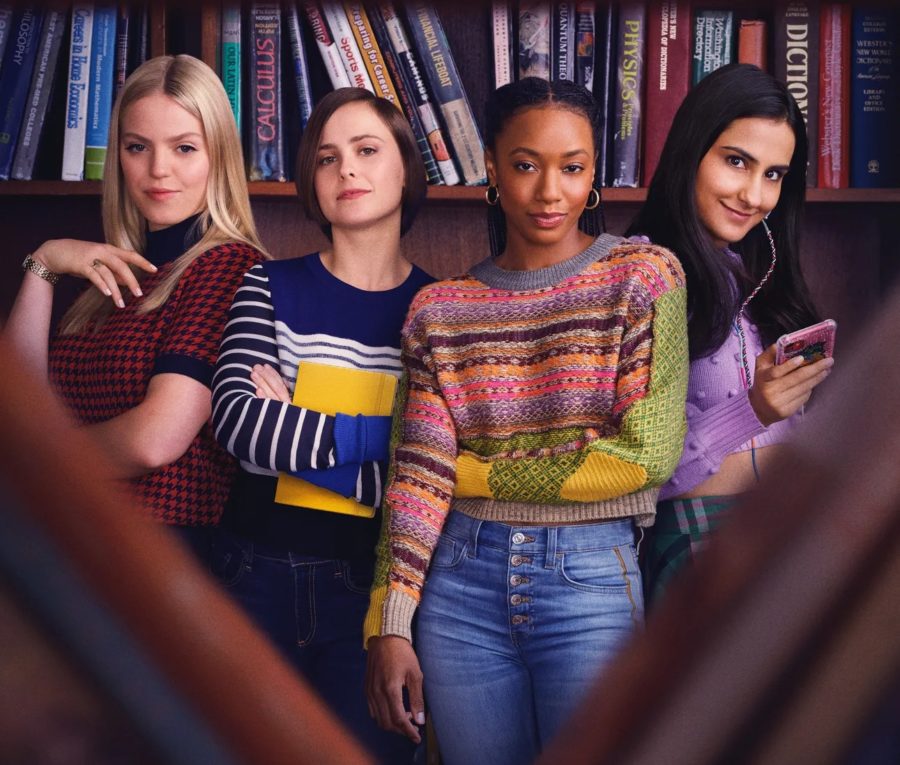Mindy Kaling’s “The Sex Lives of College Girls” is a refreshing take on the college experience
Courtesy of Warner Bros. Television Studios
Featuring a diverse cast of young women, “The Sex Lives of College Girls” reminds audiences of the chaos and beauty of navigating college.
Powerhouse screenwriter, producer and actress Mindy Kaling has quickly become an entertainment icon. She recently tapped into the realm of teen dramas, first launching the TV series “Never Have I Ever” (2020) on Netflix and now “The Sex Lives of College Girls” (2022) on HBO Max. Both coming-of-age comedies depict the chaos of adolescence through a diverse cast, but “The Sex Lives of College Girls” is special in its creation of unapologetically real characters and dialogue that make it relevant to a modern audience.
The show follows four first-year roommates at the fictional Essex College as they navigate their way through the complexities of sex, dating and friendship. The female-driven cast consists of Bela (Amrit Kaur), an aspiring comedian, Leighton (Reneé Rapp), a stereotypical upper-class legacy student, Whitney (Alyah Chanelle Scott), a recruited soccer player and daughter of a U.S. senator and Kimberly (Pauline Chalamet), a small-town girl attending university on a scholarship. United as roommates, the girls use their differing personalities and perspectives to discover who they are and who they want to be in this next chapter of their lives.
Moreover, the diversity of characters and backgrounds allows the show to tackle issues related to consent, socioeconomic class and the pressure to conform to social expectations, all while still being just as entertaining and easy to watch. Protagonists Bela and Whitney are marginalized in their professional and academic endeavors, testing their confidence and the strength of their character to pave their own future. For Bela specifically, she feels silenced by the patriarchy associated with the comedy industry and her college humor magazine, The Catullan. The show uses Bela’s experience with The Catullan not only to demonstrate the power of drive and passion, but also to critique institutions where comedy is still predominantly controlled by white males—such as Harvard University’s “Harvard Lampoon.”
As the title suggests, sex and relationships are also a major part of the typical college experience, and in turn the experiences of this cast. Through sexual exploration, the show reveals the realities of modern dating, such as the use of dating apps, hook-up culture and the pressure to conform to certain gender stereotypes. Kaling uses a nuanced and realistic approach, showing that there is no one right way to navigate the dating scene, especially on a college campus.
In handling these complex ideas, the show still manages to create relatable characters with whom many college-aged students can resonate. For instance, Kimberly’s character arc fits perfectly with that of many college students. She attends school on a scholarship and helps pay her tuition by working at the local cafe, “Sips.” Not only does she deal with the isolation of her socioeconomic class, she also struggles with growing into her sexuality and finding confidence in herself. However, with time, we see Kimberly learn to experiment with different partners and become more comfortable with her desires. In her personal life, she learns to rise from failures and find the balance between school, work and her personal life.
Although the show succeeds in purposefully using its diverse cast, it still holds on to archaic aspects of other college shows. “Teen Vogue” was one of the first to point out the romanticization of Greek life in this show, and I couldn’t agree more. The first season hinges almost entirely on Greek life being the singular means of social satisfaction, social movement and status. Every character is somehow involved in the culture, whether through desire to be in a sorority or just as an enjoyer of Greek life events and parties. This includes the depiction of frat parties as an escape from real life and sororities an exclusive symbol of class, both of which fuel the fantasy media has created about Greek life.
Overall, “The Sex Lives of College Girls” is a relatable comedy series that is refreshingly diverse and clever in the way it discusses social issues. Strong cast performances, a comedic script and characters that embody the ups and downs of early adulthood are exactly what we look for in these shows. Despite some shortcomings, Kaling once again proves her worth as a creator and producer of great TV shows, and we are excited to see what comes next.

Shivangi Nanda is a fourth-year student majoring in cognitive science, with minors in biology and chemistry. When she isn’t writing, editing, or thinking...


